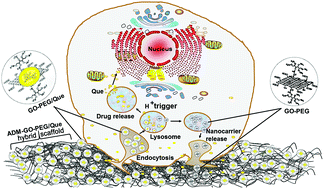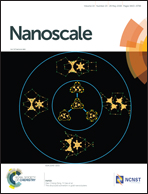PEGylated graphene oxide-mediated quercetin-modified collagen hybrid scaffold for enhancement of MSCs differentiation potential and diabetic wound healing†
Abstract
Nanoscale delivery based on polyethylene glycol (PEG)ylated graphene oxide (GO-PEG) merits attention for biomedical applications owing to its functional surface modification, superior solubility/biocompatibility and controllable drug release capability. However, impaired skin regeneration in applications of these fascinating nanomaterials in diabetes is still limited, and critical issues need to be addressed regarding insufficient collagen hyperplasia and inadequate blood supply. Therefore, a high-performance tissue engineering scaffold with biocompatible and biodegradable properties is essential for diabetic wound healing. Natural and artificial acellular dermal matrix (ADM) scaffolds with spatially organized collagen fibers can provide a suitable architecture and environment for cell attachment and proliferation. Here, a novel collagen-nanomaterial-drug hybrid scaffold was constructed from GO-PEG-mediated quercetin (GO-PEG/Que)-modified ADM (ADM-GO-PEG/Que). The resulting unique and versatile hybrid scaffold exhibited multiple advantages, including the following: a biocompatible, cell-adhesive surface for accelerating mesenchymal stem cell (MSC) attachment and proliferation; superior stability and adjustability of the conduction potential of quercetin for inducing the differentiation of MSCs into adipocytes and osteoblasts; and a biodegradable nanofiber interface for promoting collagen deposition and angiogenesis in diabetic wound repair. This study provides new prospects for the design of innovative GO-PEG-based collagen hybrid scaffolds for application in efficient therapeutic drug delivery, stem cell-based therapies, tissue engineering and regenerative medicine.



 Please wait while we load your content...
Please wait while we load your content...